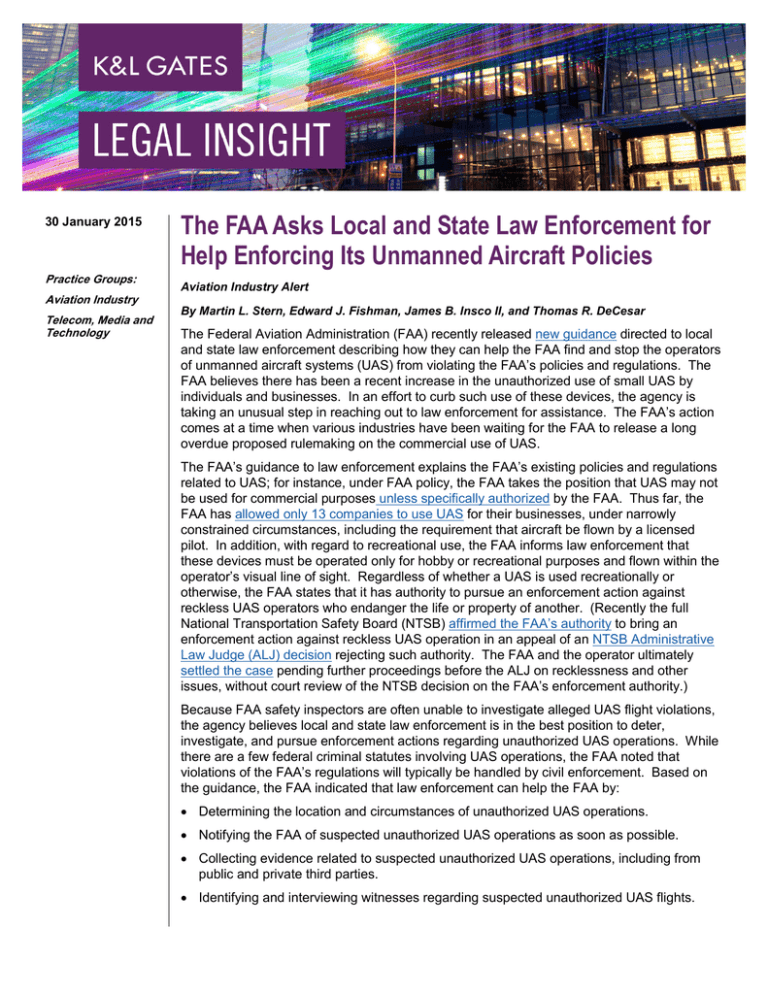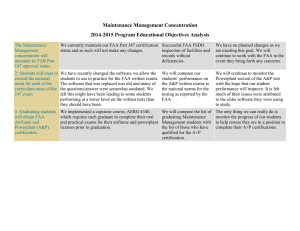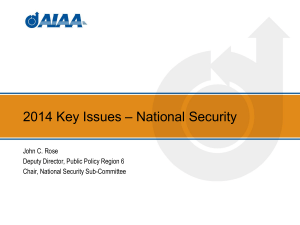
30 January 2015
Practice Groups:
The FAA Asks Local and State Law Enforcement for
Help Enforcing Its Unmanned Aircraft Policies
Aviation Industry Alert
Aviation Industry
Telecom, Media and
Technology
By Martin L. Stern, Edward J. Fishman, James B. Insco II, and Thomas R. DeCesar
The Federal Aviation Administration (FAA) recently released new guidance directed to local
and state law enforcement describing how they can help the FAA find and stop the operators
of unmanned aircraft systems (UAS) from violating the FAA’s policies and regulations. The
FAA believes there has been a recent increase in the unauthorized use of small UAS by
individuals and businesses. In an effort to curb such use of these devices, the agency is
taking an unusual step in reaching out to law enforcement for assistance. The FAA’s action
comes at a time when various industries have been waiting for the FAA to release a long
overdue proposed rulemaking on the commercial use of UAS.
The FAA’s guidance to law enforcement explains the FAA’s existing policies and regulations
related to UAS; for instance, under FAA policy, the FAA takes the position that UAS may not
be used for commercial purposes unless specifically authorized by the FAA. Thus far, the
FAA has allowed only 13 companies to use UAS for their businesses, under narrowly
constrained circumstances, including the requirement that aircraft be flown by a licensed
pilot. In addition, with regard to recreational use, the FAA informs law enforcement that
these devices must be operated only for hobby or recreational purposes and flown within the
operator’s visual line of sight. Regardless of whether a UAS is used recreationally or
otherwise, the FAA states that it has authority to pursue an enforcement action against
reckless UAS operators who endanger the life or property of another. (Recently the full
National Transportation Safety Board (NTSB) affirmed the FAA’s authority to bring an
enforcement action against reckless UAS operation in an appeal of an NTSB Administrative
Law Judge (ALJ) decision rejecting such authority. The FAA and the operator ultimately
settled the case pending further proceedings before the ALJ on recklessness and other
issues, without court review of the NTSB decision on the FAA’s enforcement authority.)
Because FAA safety inspectors are often unable to investigate alleged UAS flight violations,
the agency believes local and state law enforcement is in the best position to deter,
investigate, and pursue enforcement actions regarding unauthorized UAS operations. While
there are a few federal criminal statutes involving UAS operations, the FAA noted that
violations of the FAA’s regulations will typically be handled by civil enforcement. Based on
the guidance, the FAA indicated that law enforcement can help the FAA by:
• Determining the location and circumstances of unauthorized UAS operations.
• Notifying the FAA of suspected unauthorized UAS operations as soon as possible.
• Collecting evidence related to suspected unauthorized UAS operations, including from
public and private third parties.
• Identifying and interviewing witnesses regarding suspected unauthorized UAS flights.
The FAA Asks Local and State Law Enforcement for Help
Enforcing Its Unmanned Aircraft Policies
• Identifying UAS operators and other participants in UAS flights. The FAA notes it is
helpful for law enforcement to interview operators and determine their purpose for using
the UAS.
• Identifying locations and/or events within the law enforcement agency’s jurisdiction that
may be sensitive or susceptible to unauthorized UAS flights.
The FAA’s latest guidance signals the agency’s belief that it effectively cannot keep up with
the growing number of UAS operators. The FAA’s request for help, however, places it in
uncharted territory, since federal agencies do not typically ask state and local entities to
investigate potential violations of federal regulations and policies on their behalf. The FAA in
fact seems to recognize this by encouraging local law enforcement to also pursue applicable
violations of state laws. Moreover, the FAA cautions law enforcement to only use
“conventional administrative measures,” such as consensual interviews or examinations of
UAS, when conducting investigations on behalf of the FAA. Despite these cautions, the
FAA’s attempt to get help from local and state law enforcement is anything but
“conventional.” It remains to be seen whether the agency’s appeal to law enforcement will
increase the number of FAA enforcement actions or curb the use of UAS in a manner
deemed improper by the FAA.
Authors:
Martin L. Stern
marty.stern@klgates.com
+1.202.661.3700
Edward J. Fishman
ed.fishman@klgates.com
+1.202.778.9456
James B. Insco II
james.insco@klgates.com
+1.412.355.6744
Thomas R. DeCesar
tom.decesar@klgates.com
+1.717.231.4563
Anchorage Austin Beijing Berlin Boston Brisbane Brussels Charleston Charlotte Chicago Dallas Doha Dubai Fort Worth Frankfurt
Harrisburg Hong Kong Houston London Los Angeles Melbourne Miami Milan Moscow Newark New York Orange County Palo Alto Paris
Perth Pittsburgh Portland Raleigh Research Triangle Park San Francisco São Paulo Seattle Seoul Shanghai Singapore Spokane
Sydney Taipei Tokyo Warsaw Washington, D.C. Wilmington
K&L Gates comprises more than 2,000 lawyers globally who practice in fully integrated offices located on five
continents. The firm represents leading multinational corporations, growth and middle-market companies, capital
markets participants and entrepreneurs in every major industry group as well as public sector entities, educational
institutions, philanthropic organizations and individuals. For more information about K&L Gates or its locations,
practices and registrations, visit www.klgates.com.
This publication is for informational purposes and does not contain or convey legal advice. The information herein should not be used or relied upon in
regard to any particular facts or circumstances without first consulting a lawyer.
© 2015 K&L Gates LLP. All Rights Reserved.
2


